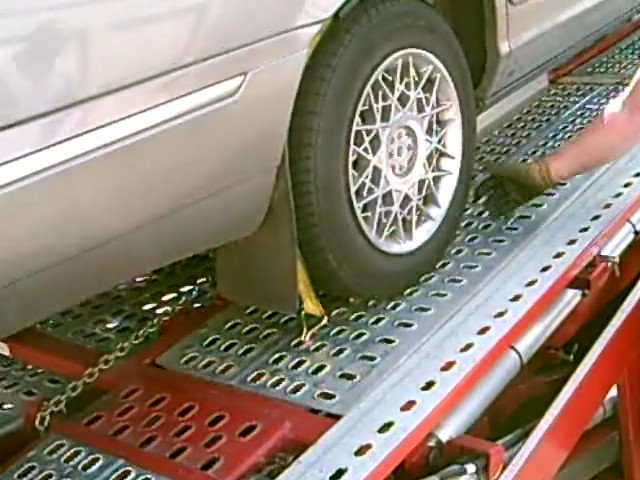This is an excerpt of a press-release I got from Boydstun today:
“Our record using the screw actuator/soft-tie strap system has been tremendous,” said Jeff Odway, National Fleet Manager for L. Hansen’s Forwarding Ltd. “We were fortunate in reducing damages significantly in the first year of a new contract. Damage reductions were attributed to the screw system running 99.77% damage free while moving approximately 22,000 vehicles in the first year.”
I actually talked to this gentleman a month or so ago, and he said that the strap trucks are actually extending the careers of some car haulers by five years or more. He said that there have been guys actually coming out of retirement to run these trucks.
He really put it in perspective, explaining that the physical demands of loading and unloading cars on a chain truck are pretty significant. You've got the weight of the chain itself, the force that it takes to crank the ratchets, plus the fact of having to climb up on the top deck to hook and unhook vehicles. It beats up on your body!
I wonder how long it's going to take the worker's comp insurance actuaries to figure out that this new technology decreases risk? Seems like decreased insurance expense would be an added benefit of going with the new technology.
Walter Frobos, who runs the shop for Southeast Auto Transport, has had similar luck hauling Toyotas with the new Boydstun screw trailers. Southeast Auto Transport is a division of JM Family Enterprises, 16th biggest privately held firm in the US. Last time I talked with him he was buying a bunch of the new trucks!
Thursday, March 15, 2007
Tuesday, March 13, 2007
How strong are your ratchet wheel straps, really?
 The AA Extra Long
The AA Extra LongThe other night a fellow who was comparison shopping called me up to ask about ratchet wheel straps. He said that the other ones he was thinking about buying were made out of 12,000 strap material.
"Ask the salesman if they come with tags showing a 4000 LB working load limit," I said.
The industry standard is for these auto tie-down straps to be tagged with the safe working load limit, calculated at a ration of 1:3 of ultimate (breaking strength) of the assembly.
Most of the straps I see on the market are built with a 5000 breaking strength hook, but few of the vendors will point that out to car haulers; they just talk about their 12,000 lb straps.
I've seen a major truck sales company selling basket tie-downs that had absolutely no working load limit tags at all. NADA!
I've seen other companies with phony working load limit tags. (Don't worry, we're putting some of those through a destructive pull-test and will publish the results.)
I've seen other companies selling ratchet straps with huge ratchets-- the kind better suited for tying down loads on a flatbed trailer, where clearance is never an issue.
When you do something day in and day out, you learn all the "tricks of the trades" and you also see people using lame sales tricks like talking about their "12,000" straps, and not mentioning the working load limit of the assembly. This industry needs to start putting safety ahead of profits and explaining to buyers EXACTLY what they're getting, and how long the warranty is on the product. (Not to mention, how long the strap is!)
Subscribe to:
Comments (Atom)

